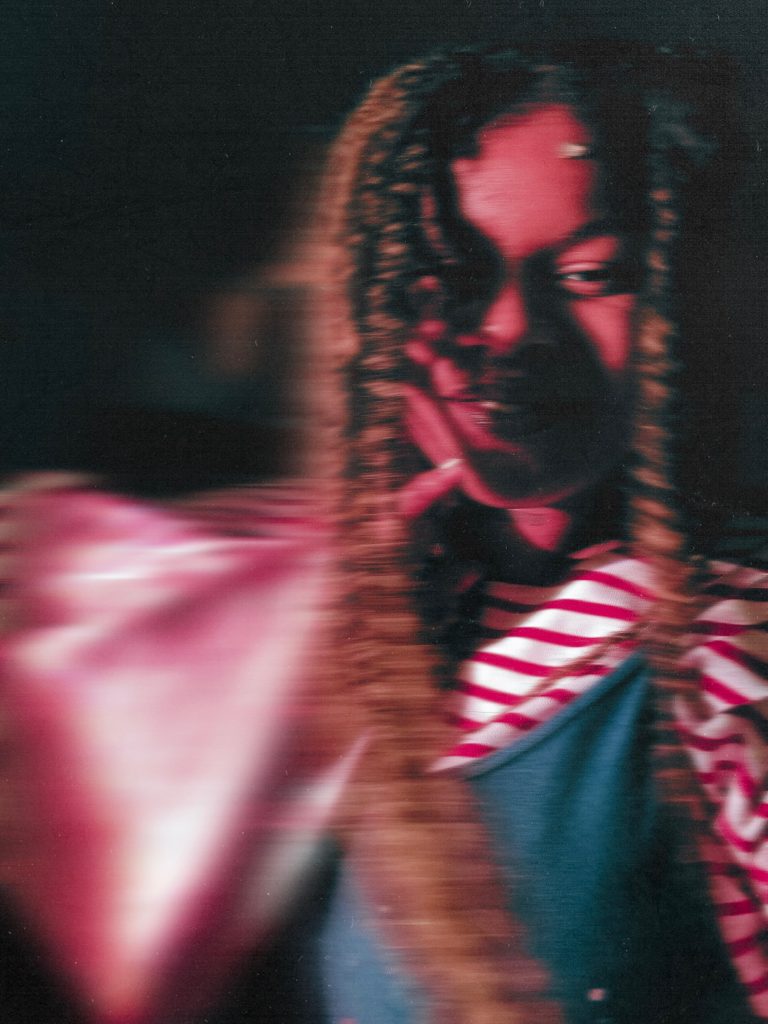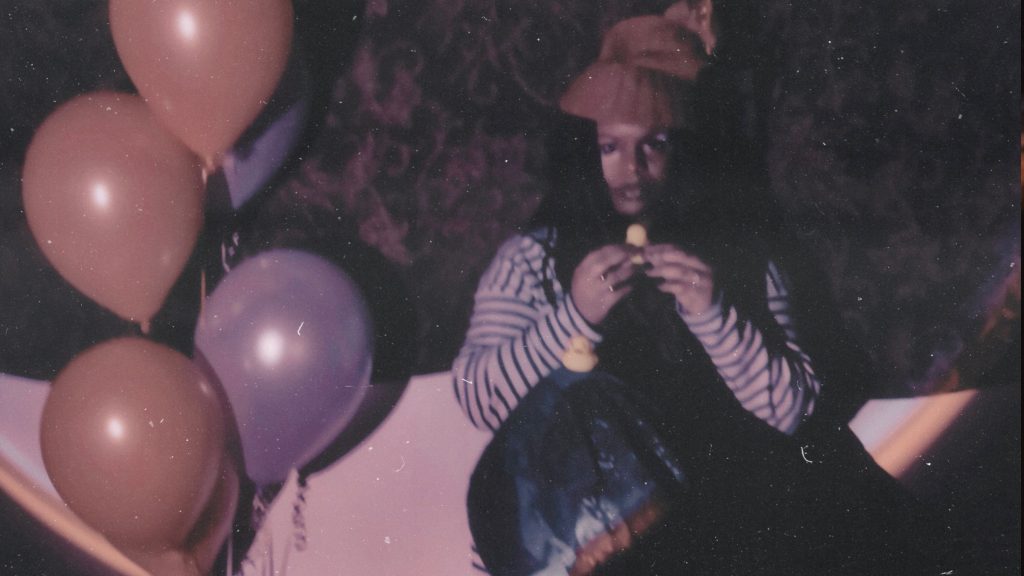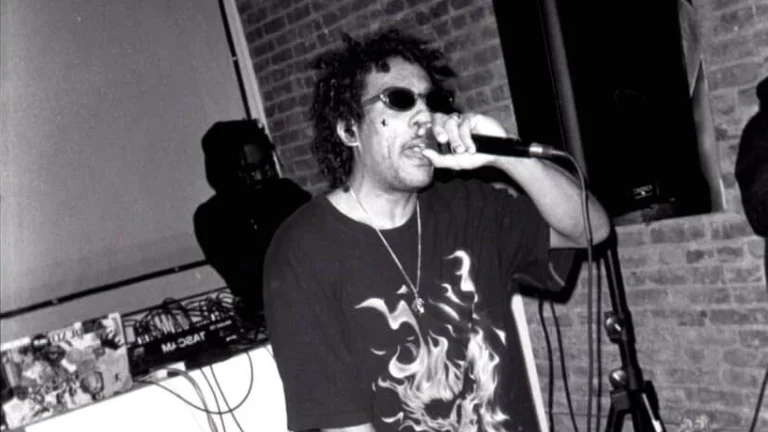What happens when you blend stand-up comedy timing with poetic precision, then lace it through jazz loops and jittery Midwest boom bap? You get MERRY&RUE, the latest dispatch from Imani Nichele, the Detroit-bred, Chicago-based poet and artist, utterly uninterested in playing to anyone’s expectations.
Across this sleek project, Nichele monologues, side-eyes, deflects, and dismantles. There’s a feeling throughout the EP that we’re not simply listening in, we’re being invited into something special—a front-row seat to her unfiltered inner world, and not for applause or agreement. In fact, MERRY&RUE is the kind of tape that doesn’t care if you’re clapping or, in this case, laughing, as the intro would suggest.
From the moment she opens with “haha,” the tone is set: part laugh track, part landmine. It can even be read as the crowd laughing with her—or at her—especially when the ending applause is scattered and almost uncertain, as if the crowd isn’t sure whether to cheer or turn its attention elsewhere. But still she rides the beat, her words firing off rapidly yet laid back, confident in a way that says the only person she’s trying to impress is herself, like it’s a silly thing to be bothered about crowd response. “I’m acting funny, Marlon Wayans,” she quips, lifting the comedic mask to flash something more bruised underneath; a move that becomes typical of her code-switching between humor and hurt.
Yet the tension between self-assurance and self-questioning gives MERRY&RUE its emotional gravity. You hear it ripple under the processional cadence of snares and bass on “ROYAL // SOLILOQUY,” where Nichele spills over herself in waves of defiance and doubt. One second she’s flossing with punchlines: “Got this shit bagged like it’s Goyard,” and the next she’s peeling herself open: “sound escaping, snot streaming from up out of my nose.” Continuing the confession: “I bet they hope that I choke / This world is out to get me, feels I’m out of place.” And still, she remains “faithful as her pendulum sways.” The world may have bruised her and left fingerprints, but it’s nothing she can’t get behind.
What’s remarkable is how MERRY&RUE is expansive, with an emotional range stretching wide while staying so spare; Nichele keeps the features tight and the production lean. And Nolan the Ninja’s beats, mellow hip-hop laced with jazz flourishes, settle into an almost spoken word, late-evening glow, giving her room to stretch without slipping into self-indulgence. Throughout the project, the focus never drifts far from her voice, or rather, voices. Even as she moves from whisper to war cry, shrug to soliloquy, it’s theatrical, but never performative. In its quietest moments, there’s restlessness. On “Chall,” she’s “playing offense” over a steady, easy-swinging drum groove leaning against a darkish vibe. Her flow stays smooth, even sly, while a male voice vocalizes in the background, deepening the track’s moody undertone as she turns philosophical while meditating on smallness and significance with a Missy Elliott-inspired playful flair. “I ain’t sleeping up and spending shit… for no critics to box me,” she raps.
To celebrate MERRY&RUE, EveryDejaVu talked with Nichele about the process behind MERRY&RUE, the people who shaped her voice, and why she’s more interested in becoming than arriving.
To start, who is Imani Nichele, the artist? Has your relationship with yourself changed through making music, and do you see yourself as separate from your art?
I don’t think I get to decide who I am. That’s far too definitive—my only job in this life is to be open to everything I’m supposed to become… we can go with that. ‘Imani Nichele is becoming…’
Music has definitely helped deepen the relationship I have with myself. I don’t think it’s possible to separate me from the things I create; it only challenges me to remain curious and expand my definition of ‘self.’
Listening to you, you have this sharp yet conversational style of rapping that feels too distinctively like spoken word. How did you arrive at that voice?
It grew over time. I spent a lot of my teen years doing slam, so there are elements of that present. We jokingly would call it a ‘poet voice,’ but in my newer work, I have been trying to be more conversational in my delivery. It allows me to display my personality a bit more in my music. If I’m just speaking to the listener like I’ve known them my whole life, it makes me a bit more cozy.
You’ve referenced comedy, philosophy, and jazz across your work. Who are the storytellers or creators who shaped you?
Just the everyday people, both in my life and passing through it. I’m an observer by nature, and I find beauty, comedy, and music in everything… a tool I HAD to choose to survive, but I’m super grateful for. I mean, I could name artists and writers like Lucille Clifton, Jean Grae, Isaiah Rashad, Hanif Abdurraqib, or Nate Marshall, but they didn’t show up until later. It wasn’t as much shaping as it was affirming me.
Tell me about your creative process. Do you have any rituals you do to get in the right headspace while creating or recording music?
The bathroom is my go-to place. I like to be completely alone at home, the door closed with the shower running. That gets me in my zone every time.
There’s this tension between self-assurance and self-questioning in your music. Do you see your art as a way of reconciling that, or just as a space to live with it?
Definitely a space to live with, insecurity and security have a natural place in my body as a human. I don’t think I’m ever looking for a cure; music and art allow me space to embrace duality.
Humor shows up as a weapon, a shield, and a survival tactic in your work. Is that how you move through the world, too? Has humor ever backfired on you in a way that changed how you use it in your art?
I navigate the world very similarly to how I show up on tracks. I’m a very honest person, and I can be pretty deadpan and sarcastic. Sometimes that makes people feel I’m hard to read; oftentimes it feels like people don’t know how to react to me, so it’s easier to assume I’m telling a joke even when I’m dead serious. But I never change my delivery, I feel like the people that get it, get it.

Do you think your music is more about finding answers or asking better questions?
Asking better questions for SURE. Finding answers is a losing game because nothing in life is static. You’ll never be satisfied. Asking better questions empowers you to find the things within and around you to change your life, no matter what comes your way.
What’s a creative risk you took with MERRY&RUE that scared you, but you’re glad you did it?
The risk was the tape itself. Just making everything from scratch, and not knowing anyone in the industry—I really bet on myself.
How did you approach sequencing the project? The flow feels intentional, almost like we’re moving through acts in a play. Was there a storyline or emotional arc guiding you?
I considered the shape of this project while sequencing. The first track I made for M&R was “haha,” and that track set the tone for the rest of the tape. This project was really my honest attempt at translating the circus that is my inner world. Throughout the tape, I’m exploring themes of grief, gratitude, sensuality, origin, self-assuredness, and insecurity all at once. This ‘organized chaos’ also serves as a personal love letter to hip-hop and all its elements.
You worked with Nolan the Ninja as a co-producer on this project. I’m curious about how that creative partnership came about and what made you feel he was the right person to help shape this project. How would you describe the energy in the room when you and Nolan were creating?
Nolan produced a lot of the tracks on M&R. It was kind of accidental—we followed each other on Twitter a couple of years back. He said he liked a song I made that was pinned to my profile at the time, and the rest is history. He just cooks up daily and sends tracks over, and the ones I really liked, I was like, this one is mine, don’t send it out. I didn’t know I was making a mixtape until it happened. Also, shout out Wavy Bagels for his production on “Bark!,” Sirplus on “Way Down,” and Brando Heat on “Playright.” Also, shout out me for self-producing “Quin.”
When you think about your dream collaborators—producers, poets, musicians, and everything in between—who’s on the list?
Daughter, because it’s the soundtrack to my middle school years. I would LOVE to jam with the band or even just have a writing session with Elena Tonra.
Jean Grae, because I would want to do a collaborative visual art piece with her. I think overall she’s a super talented and interesting person, and reading her book has me wanting to dive deeper into her mind.
Dion Jenkins, because his work with Hi-Tek is what made me a fan. He has one of the most beautiful singing voices, and writing for him would make me super happy
Isaiah Rashad, because he is a REALLY big reason I rap. It would be super dope to share a stage with him.
Rachelle Ferrell! This one is out there, but the first song I heard of hers was “I forgive you,” and I cried for almost an hour after hearing it. I think more than anything, I’d just like to observe her creative process.
I love the theatrical intensity of “ROYAL/SOLILOQUY.” Did you surprise yourself on that track? Did you go somewhere emotionally that you didn’t expect when you first started writing it?
To me, that track felt like a therapy session while writing. I actually wrote a poem first with the same themes present, but my body didn’t feel done processing the topic of accountability and acceptance. I decided to flesh it out more in a song, and I was finally able to close that loop.
If MERRY&RUE was the last thing you ever released, what would you hope it says about you?
That I contain multitudes, that I don’t feel shame, and that radical honesty is a big part of my artistry.





